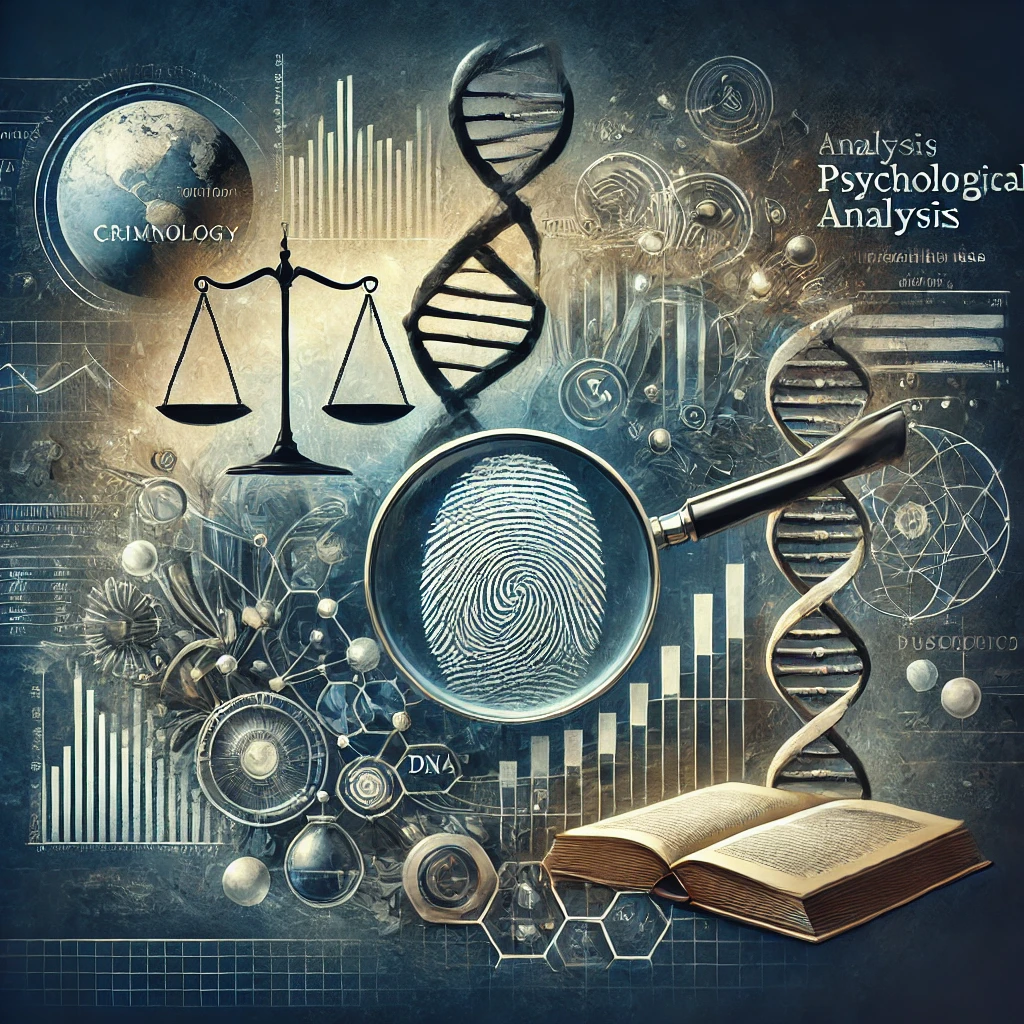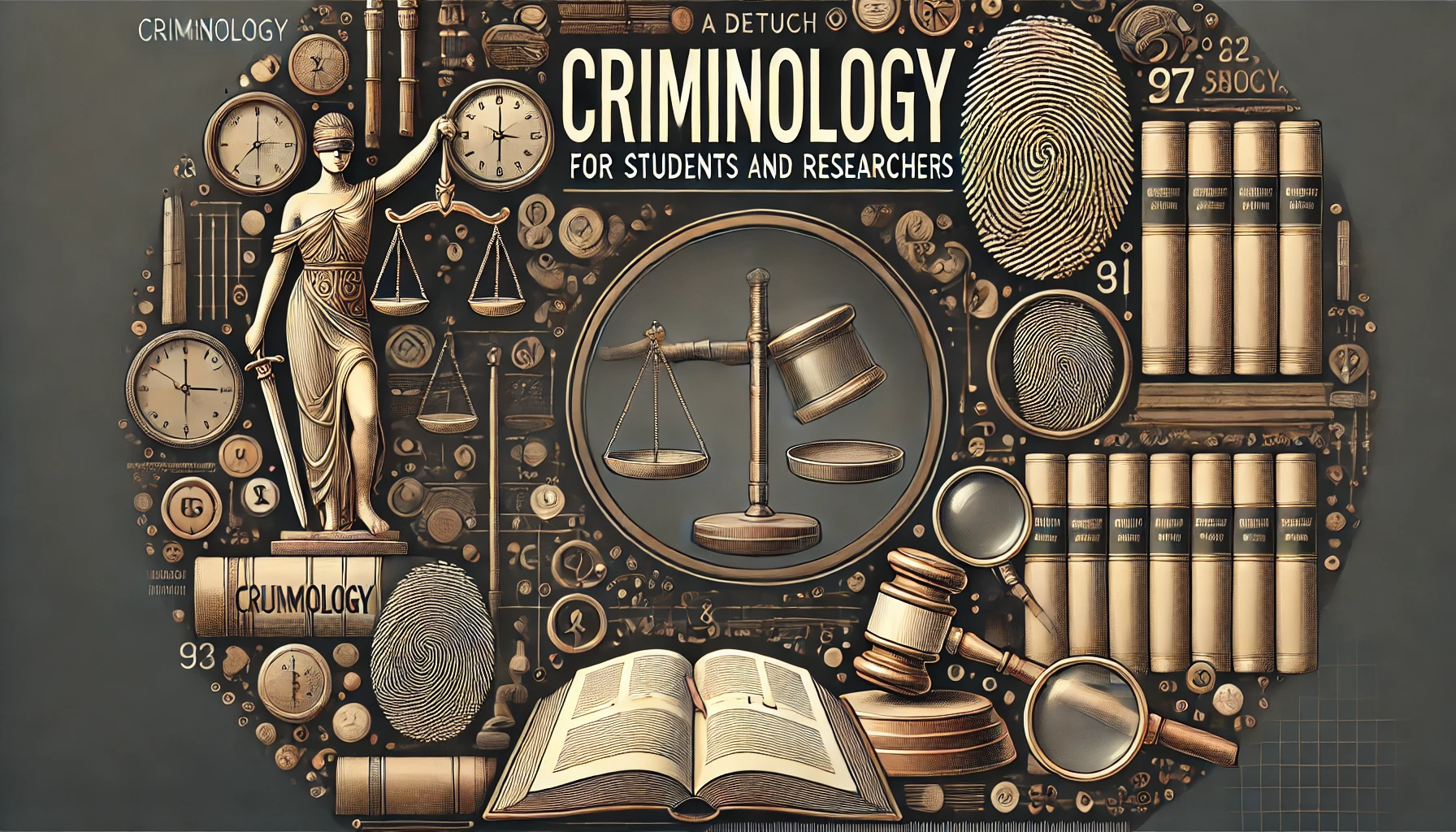1. Definition of Criminology
A. What is Criminology?
Criminology is a multidisciplinary study of crime, viewing it as a social, psychological, and legal phenomenon. This field focuses on analyzing and understanding criminal behavior scientifically, aiming to identify the factors that drive individuals to commit crimes. Unlike forensic sciences, which deal with criminal investigations and the implementation of criminal justice, criminology centers on research and analysis to comprehend crime as a human and social occurrence.
B. Fields of Criminology
Criminology encompasses various fields that reflect its multidisciplinary nature, including:
- Criminal Sociology: This branch examines the influence of social structures and environmental contexts on individuals’ criminal behaviors, analyzing factors like poverty, family breakdown, and social relationships that can lead to crime.
- Forensic Psychology: Focuses on studying the internal psychological motives of individuals that can lead to criminal behavior, covering psychological factors such as anger, aggression, mental disorders, and emotional influences.
- Biocriminology: Attempts to explain criminal behavior through biological factors such as genetics and hereditary traits, examining how biology may influence individuals toward criminality.
C. Historical Development of Criminology
Criminology has evolved significantly since the 19th century with pioneers like Italian criminologist Cesare Lombroso, who is known for founding the biological theory of criminology. Lombroso believed that some individuals possess inherited physical traits that make them more prone to criminal behavior.
Over time, criminology has expanded to include psychological and social aspects, leading to new approaches to understand crime and its motivations comprehensively, rather than relying on single-factor theories.
2. The Scientific Foundations of Criminology
A. Methodologies Used in Criminology
Criminology relies on various scientific methodologies that enable a precise understanding and analysis of criminal phenomena. Key methodologies include:
- Experimental Studies: Scientific experiments are used to study factors that lead to criminal behavior by testing hypotheses in controlled environments. For example, experiments can examine how peer pressure influences criminal decisions.
- Statistical Analysis: Statistical analysis aids in organizing crime data, such as crime rates, types, and geographical distribution, to analyze patterns and trends in criminal behavior. Researchers use statistical data to predict high-risk areas, guiding preventive policies.
- Field Interviews and Surveys: These methods help understand personal and social motivations among criminals and their surroundings. Fieldwork allows researchers to collect firsthand information, offering insights into behaviors from both personal and societal perspectives.
B. Multidisciplinary Influences in Criminology
Due to the complex nature of criminal behavior, criminology benefits from various scientific fields, such as:
- Forensic Science: Provides material evidence regarding crimes, such as analyzing crime tools or fingerprints, which helps identify perpetrators and analyze criminal motives.
- Psychology and Sociology: Psychology contributes to understanding the psychological aspects of criminal behavior, while sociology helps interpret the impact of social structures and relationships on crime.
- Criminal Law: Sets the frameworks for dealing with crime legally, classifying criminal acts and establishing the basis for punishments, which provides a legal perspective on crime.
C. Importance of Scientific Evidence in Criminology Studies
Scientific evidence plays a central role in criminology research, enabling researchers to build hypotheses based on facts, which enhances accuracy and credibility. Evidence, such as forensic analysis of tools or scientific investigations, helps understand the circumstances surrounding crimes, forming a strong basis for developing prevention and intervention strategies.

3. The Importance of Criminology for Researchers and Students
A. The Role of Criminology in Academic Studies
Criminology provides an expansive academic field that allows students and researchers to understand criminal phenomena, which helps them develop their research and analytical skills. By studying criminology, researchers gain in-depth knowledge of the factors that lead to crime and how to handle it effectively, which prepares them for relevant professional fields.
B. Career Opportunities and Employment Fields
Criminology offers various career opportunities for students, including:
- Criminal Investigation and Law Enforcement: Criminology graduates can work in criminal investigations and evidence analysis to aid law enforcement in solving crimes.
- Education and Training: After graduation, students can transfer criminology knowledge to others or train within security institutions.
- Security Planning and Crime Prevention: Jobs in this field involve analyzing data and developing strategies for crime prevention and planning security policies that enhance public safety.
C. The Importance of Criminology in Enhancing Critical Thinking
Criminology enhances students’ ability to think critically and analyze complex social behaviors. This field trains students to study, interpret, and evaluate criminal behavior, which cultivates their ability to propose scientifically and practically sound solutions to combat crime.
4. The Role of Criminology in Understanding and Interpreting Criminal Behavior
A. Causes of Criminal Behavior from a Criminological Perspective
Criminology seeks to understand the underlying reasons for criminal behavior, which may include:
- Biological Factors: Research suggests that heredity may affect criminal behavior, with studies examining the role of genes in aggressive behaviors.
- Psychological Factors: Such as personality and mental disorders, which can make individuals more prone to crime, like antisocial personality disorder.
- Social and Economic Factors: Issues like poverty, unemployment, and social marginalization, which may push individuals toward crime as a means of overcoming their hardships.
B. Analyzing Behavioral Patterns and Crime
Criminology focuses on studying criminals’ behavioral patterns to analyze motivations and understand characteristics that distinguish them. This analysis aids security agencies in anticipating criminal behaviors based on specific traits, enhancing preventive measures.
C. Criminology’s Role in Crime Prevention
Criminology plays a crucial role in crime prevention by developing strategies that address the underlying causes of crime and offering comprehensive intervention plans. These strategies include community awareness, and improving economic and social conditions, ultimately contributing to reducing crime rates and creating a safer environment.
Conclusion
In conclusion, criminology is a vital field for understanding crime from its various perspectives. It relies on scientific methodologies and objective evidence to explain criminal behavior, contributing to effective strategies for combating crime.

